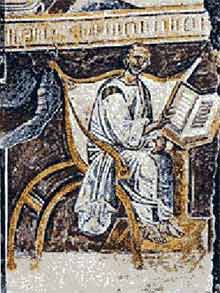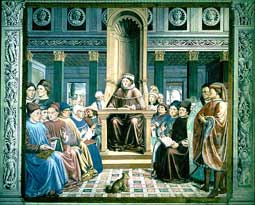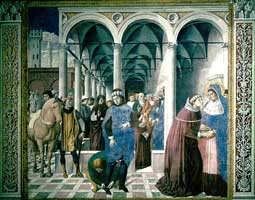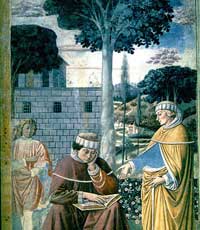Readings:
Wisdom 16:20-26
Psalm 87
Hebrews 12:22-29
John 14:5-15Preface of Baptism
[Common of a Theologian]
[Common of a Pastor]
[Of the Holy Trinity]
[For the Ministry II]
PRAYER (traditional language)
Lord God, the light of the minds that know thee, the life of the souls that love thee, and the strength of the hearts that serve thee: Help us, following the example of thy servant, Augustine of Hippo, so to know thee that we may truly love thee, and so to love thee that we may fully serve thee, whose service is perfect freedom; through Jesus Christ our Lord, who liveth and reigneth with thee and the Holy Ghost, one God, now and for ever. Amen.
PRAYER (contemporary language)
Lord God, the light of the minds that know you, the life of the souls that love you, and the strength of the hearts that serve you: Help us, following the example of your servant, Augustine of Hippo, so to know you that we may truly love you, and so to love you that we may fully serve you, whose service is perfect freedom; through Jesus Christ our Lord, who lives and reigns with you and the Holy Spirit, one God, now and for ever. Amen.
Lessons revised at General Convention 2024
Return to Lectionary Home Page
Webmaster: Charles Wohlers
Last updated: 10 July 2024
AUGUSTINE OF HIPPO
BISHOP AND THEOLOGIAN (28 AUGUST 430)
 |
| A 6th C. portrait of St. Augustine, from St. John Lateran |
When he was 19 and a student at Carthage, he read a treatise by Cicero that opened his eyes to the delights of philosophy. He was from the beginning a brilliant student, with an eager intellectual curiosity, but he never mastered Greek -- he tells us that his first Greek teacher was a brutal man who constantly beat his students, and Augustine rebelled and vowed never to learn Greek. By the time he realized that he really needed to know Greek, it was too late; and although he acquired a smattering of the language, he was never really at home in it. However, his mastery of Latin was another matter. He became an expert both in the eloquent use of the language and in the use of clever arguments to make his points. He became a teacher of rhetoric in Carthage, but was dissatisfied. It was the custom for students to pay their fees to the professor on the last day of the term, and many students attended faithfully all term, and then did not pay. In his late twenties, Augustine decided to leave Africa and seek his fortune in Rome.
 |
|
Augustine
teaching in Rome, by Gozzoli
|
Augustine prospered in Rome, and was eventually appointed chief professor of rhetoric for the city of Milan, at that time the capital city of the Empire in the West. It should be noted that this was an extremely prestigious appointment. In classical times, when laws were often made and issues voted on by huge public assemblies, when even juries typically had several hundred members, and when a man's public influence, or even on occasion his life, depended on his ability to sway large audiences, rhetoric -- the art of manipulating an audience -- was a skill that few men thought they could afford to neglect. (Socrates was one of the few, and we know what happened to him!) The art, at first intensely practical, had by Augustine's day become a display form admired for its own sake. However, the admiration was there. Every lawyer, arguing a case, was expected to give an eloquent speech, full of classical allusions and standard rhetorical flourishes. And Augustine was at the top of the field.
 |
|
St.
Augustine entering Milan, by Gozzoli
|
Soon after his arrival in Milan, Augustine was plunged into two crises. First, his mother arrived from Africa, and persuaded him that he ought to give up his mistress and get married. He agreed to a betrothal to a suitable young lady; but his betrothed was too young for immediate marriage, and so the actual wedding was postponed for two years. Meanwhile the mistress had been sent back to Africa. Augustine, not ready for two years of sexual abstinence, lapsed back into promiscuity.
The second crisis was that Augustine became a neo-Platonist. Plato, as interpreted by his later spokesmen, in particular by Plotinus, taught that only God is fully real, and that all other things are degenerations in varying degrees from the One--things are progressively less good, less spiritual, and less real as one goes rung by rung down the cosmic ladder. By contemplating spiritual realities, directing one's attention first to one's own mind and then moving up the ladder rung by one to the contemplation of God, one acquires true wisdom, true self-fulfilment, true spirituality, and union with God, or the One. Augustine undertook this approach, and believed that he had in fact had an experience of the presence of God, but found that this only made him more aware of the gulf between what he was and what he realized that he ought to be.
Meanwhile, he continued to hear Bishop Ambrose. And finally, partly because Ambrose had answers for his questions, partly because he admired Ambrose personally, and chiefly (or so he believed) because God touched his heart, he was converted to Christianity in 386 and was baptised by Ambrose at Easter of 387. About 12 years later he wrote an account of his life up to a time shortly after his conversion, a book called the Confessions, a highly readable work available in English. Ostensibly an autobiography, it is more an outpouring of penitence and thanksgiving.
 |
|
"Take
and Read", by Gozzoli
|
The night is far gone, the day is at hand.As he read, he experienced this as God speaking directly to him, convicting him of his past sins, and offering him forgiveness; calling him to amend his life, and promising him the grace and power to do it. He burst into tears, and surrendered. Later, he wrote:
Let us then cast off the works of darkness
and put on the armor of light;
let us conduct ourselves becomingly as in the day,
not in reveling and drunkenness,
not in debauchery and licentiousness,
not in quarreling and jealousy.
But put on the Lord Jesus Christ,
and make no provision for the flesh,
to gratify its desires.
Late have I loved Thee, O Lord; and behold,Although written as an account of his life, the Confessions keeps digressing into speculations about the nature of time, the nature of causality, the nature of free will, the motives of human action, etc.
Thou wast within and I without, and there I sought Thee.
Thou was with me when I was not with Thee.
Thou didst call, and cry, and burst my deafness.
Thou didst gleam, and glow, and dispell my blindness.
Thou didst touch me, and I burned for Thy peace.
For Thyself Thou hast made us,
and restless our hearts until in Thee they find their ease.
Late have I loved Thee, Thou Beauty ever old and ever new.
Thou hast burst my bonds asunder;
unto Thee will I offer up an offering of praise.
Louis deWohl has written a novel about Augustine, based mostly on the Confessions, called The Restless Flame. It is an excellent introduction to the man.
After his conversion, Augustine went back to his native Africa in 387, where he was ordained a priest in 391 and consecrated bishop of Hippo in 396. It was not his intention to become a priest. He was visiting the town of Hippo (or Hippo Regius, now Annaba, 36:55 N 7:47 E), was in church hearing a sermon, and the bishop, without warning, said, "This congregation is in need of more priests, and I believe that the ordination of Augustine would be to the glory of God." Willing hands dragged Augustine forward, and the bishop together with his council of priests laid hands on Augustine and ordained him to the priesthood. (The experience may have colored Augustine's perception of such questions as, "Does a man come to God because he has chosen to do so, or because God has chosen him, and drawn him to Himself?") A few years later, when the Bishop of Hippo died, Augustine was chosen to succeed him.
He was a diligent shepherd of his flock, but he also found time to write extensively. He was an admirer of Jerome, and wrote him a letter hoping to establish a friendship, but the letter went astray. (In those days there was no public post office, and if you wanted to send a letter to a friend in Athens, you entrusted it to someone you knew who was travelling to Athens, or at least in that general direction, with instructions to deliver it or pass it on to someone else who would oblige.) Jerome did not get the letter, and the contents became public knowledge before he heard of it. Augustine, in addition to saying how much he admired Jerome, had offered some criticisms of something Jerome had written. Jerome was furious, and came close to writing Augustine off altogether. However, Augustine wrote him a second letter, apologizing and explaining what had happened, and Jerome was mollified. They had a long and intellectually substantial correspondence.
Augustine's written output was vast, and largely responsible for the fact that the entry for him in the index of the Encyc. Brit. is more than a column long. His surviving works (and it is assumed that the majority did not survive) include 113 books and treatises, over 200 letters, and over 500 sermons. His work greatly influenced Luther and Calvin, to the point where for a while Roman Catholic speakers and writers were wary of quoting him lest they be suspected of Protestant tendencies.
We have already mentioned his Confessions. A second great work of his is the book, De Civitatae Dei (The City of God). This was written after Rome had been sacked by invaders led by Alaric the Visigoth. It is a reply to those who said that the Roman Empire was falling apart because the Christians had taken over; he discusses the work of God in history, and the relation between the Christian as citizen of an earthly commonwealth and the Christian as citizen of Heaven.
His third great work is his De Trinitate (On
the Trinity). Here, he discusses the doctrine of the Trinity by
undertaking to compare the mind of man with the mind of God, since man
is made in the image of God (Genesis 1:27). Augustine begins by pointing
out a Trinitarian structure in the act of knowing something. He continues
by pointing out a Trinitarian structure in the act of self-awareness.
He concludes by pointing out a Trinitarian structure in the act of religious
contemplation by which man sees himself as made in the image of God.
AUGUSTINE AND THE DONATISTS
Almost a century before Augustine was born, the Church in Africa had been torn apart by the Donatist controversy. For a brief account of this controversy (and the Pelagian and other controversies of the day), but a longer one than I am prepared to give here, I refer the reader to the relevant section of the book, Sketches of Church History, by Canon Robertson.During the persecution of the Church by the Emperor Decius, some Christian
clergymen in Africa, or so it was alleged, had stood firm against threat
of torture, imprisonment and death more consistently and nobly than others.
The Donatists maintained that their clergy derived their ordinations from
clergy with very good records of constancy under persecution, and that
they were the Church of the Martyrs, as opposed to the Church of
the Sell-outs, which was everybody else. They further held that sacraments
received at the hands of unworthy ministers were of no value. Or at least
it seems that they held this. Augustine had a long correspondence and
controversy with them, and at one point they apparently replied that they
did not hold this, to which Augustine replied, "In that case, will you
kindly tell me what the controversy is all about, and what you and I have
been debating for the last eighteen months, and what your bishops and
ours have been out of fellowship with each other about for the last century?"
The controversy dragged on, with part of the dispute historical (whether
Bishop so-and-so, now seventy years dead, had really done what he was
accused of doing), and part theological. It seems clear that the Donatists,
at least most of the time, argued that the holiness of the Church depended
on the holiness of its members, especially its clergy. Against them, Augustine
maintained that the holiness of the Church is not derived from the average
level of virtue of its individual members, but is derived from the Holiness
of its Head, who is Christ.
AUGUSTINE AND THE PELAGIANS
In Augustine's day, a man from Britain named Morgan, or in Latin Pelagius (means "islander" -- consider the words "pelagic" and "archipelago"), began to preach, denouncing what he saw as a slackening of moral standards. He saw professed Christians living less than exemplary lives, and offering human frailty as an excuse. His reply was: "Nonsense. God has given you free will. You can choose to follow the example of Adam, or you can choose to follow the example of Christ. God has given everyone the grace he needs to be good. If you are not good, you simply need to try harder." Augustine asked him about original sin, and he replied that there is no such thing. Augustine asked him why, in that case, it was the universal custom to baptize infants, and he had no answer. Augustine saw the teaching of Pelagius as totally undermining the doctrine that God is the ultimate source of all good, and encouraging the virtuous and well-behaved Christian to feel that he had earned God's approval by his own efforts. Pelagius was condemned by Pope Innocent I, and then re-instated by Pope Zosimus. Augustine refused to accept the judgement of Zosimus, and ultimately won the day.Near the end of his life, the Vandals, a barbarian people with a reputation
for wanton destructiveness (hence our modern term "vandal"), who had earlier
invaded Spain from the north and settled down there (hence the province
of Spain called "Andalusia"), became involved in a civil war in Northern
Africa, and their troops invaded Africa in huge numbers. The leader of
the losing side took refuge in the town of Hippo, and the Vandals were
besieging the town (which they ultimately captured) when Augustine,
bishop of Hippo, died 28 August 430, aged 75.
[Several of Augustine's works can also be found online at the Christian Classics Ethereal Library.]